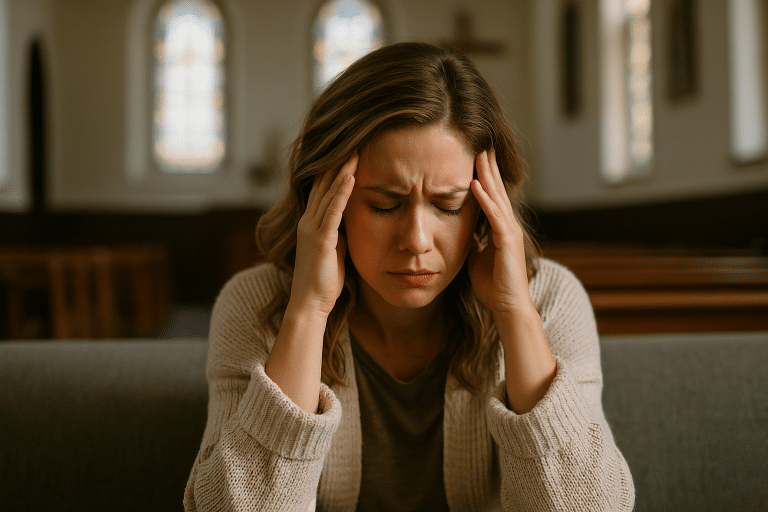God And Anxiety Can Christians Have Anxiety: A Gentle Guide
Introduction
Many believers quietly ask a hard question: god and anxiety can christians have anxiety? Yes. Scripture shows faithful people wrestling with fear while clinging to God’s promises. Therefore, this guide offers a compassionate, research‑supported path that blends biblical hope with clinical wisdom. Moreover, it explains how your body’s stress systems work, why anxiety is not a personal failure, and how practical steps—spiritual and medical—can help you live with calm, courage, and joy.
Because the church thrives when we name our struggles and seek help, you will find simple language, clear next steps, and trusted resources here. Additionally, you will see links to foundational evidence from organizations like the National Institute of Mental Health, the World Health Organization, and Harvard Health Publishing. Finally, you will find gentle pastoral counsel grounded in the Bible and lived experience within Christian community.
What Causes Anxiety In Body And Soul
First, your body contains a God‑designed alarm system. When your brain perceives a threat, the amygdala triggers adrenaline and cortisol. Consequently, your heart rate rises, breathing speeds up, and muscles tense to prepare for action. This “fight‑or‑flight” response keeps you safe in emergencies; however, chronic activation can produce persistent anxiety and exhaustion. For an accessible medical overview, see Harvard’s explanation of the stress response, which describes these hormonal surges and their physical effects in daily life (Harvard Health).
Second, anxiety includes learned thoughts and habits. For example, catastrophic thinking amplifies normal stress into continual dread. Additionally, perfectionism, people‑pleasing, or unresolved grief can sustain anxious loops. Because body and mind interact, medical conditions like thyroid imbalance and sleep debt can intensify symptoms. Meanwhile, global data confirm how common anxiety truly is; the World Health Organization reports hundreds of millions affected worldwide, and many never receive treatment because of stigma or access barriers (WHO fact sheet).
Third, Christians and anxiety often collide with shame. However, the Bible shows David, Elijah, and Paul voicing fear while turning toward God. Therefore, feeling anxious does not equal failing God. Instead, it signals an invitation to bring our whole selves to Him and to wise helpers. To go deeper on biblical framing, explore this internal guide on anxiety and biblical guidance.

Biblical Hope For Christians And Anxiety
Because God is near to the brokenhearted, Scripture never shames honest fear. Instead, it redirects our attention. Philippians 4:6–7 calls us to turn worries into prayer with thanksgiving, and the peace of God guards our hearts and minds. Likewise, Jesus says, “Do not let your hearts be troubled,” then gives His peace (John 14:27). Therefore, when anxiety rises, we practice trust in concrete ways: we pray, we breathe, we remember God’s care, and we ask others to carry our burdens with us.
Moreover, wisdom literature commends counsel. Proverbs 11:14 and 15:22 celebrate many advisers. Consequently, seeking a counselor or physician aligns with biblical prudence, not unbelief. For a practical walk‑through of faith practices in hard moments, see these cornerstone resources on prayer for anxiety and simple deep breathing exercises that pair well with Scripture meditation.
Finally, remember the core question—god and anxiety can christians have anxiety. Yes, and God invites us to cast every care on Him while also using wise means. Therefore, we move forward with both courage and humility, taking the next faithful step.
Clinical Care And Christian Anxiety
Modern care offers tools that often work alongside prayer. Cognitive Behavioral Therapy helps people notice distorted thoughts and practice new patterns. Consequently, many patients see improved function within weeks. For an overview of CBT written for the public, visit the American Psychological Association’s summary (APA on CBT).
Medication can also help when symptoms impair daily life. Selective serotonin reuptake inhibitors commonly treat anxiety by increasing synaptic serotonin, which can reduce hyperarousal over time. Because these medicines require clinical guidance, talk with a licensed prescriber and ask about benefits, side effects, and taper plans. To understand the category, see this clinical reference from StatPearls (SSRIs) or consumer‑friendly overviews on MedlinePlus. Additionally, U.S. prevalence data from the NIMH highlight how common these conditions are, which helps reduce stigma.
Importantly, clinical care and discipleship are not rivals. Rather, they cooperate. Therefore, answering the question god and anxiety can christians have anxiety includes this pastoral truth: God can work through prayer, community, therapy, and medicine at the same time.
A Practical Plan To Calm Body And Trust God
Start small and specific. Because anxiety often narrows attention, choose two anchor practices you can repeat daily. For example, begin mornings with five slow breaths and a short prayer from Psalm 23. Next, write a brief gratitude list. Additionally, build a five‑minute evening examen: ask, “Where did I notice God today, and where did I worry most?” Consequently, you will practice returning to the Shepherd as your nervous system settles.
Then add layered supports. Moreover, choose a weekly rhythm of movement, sleep, and Scripture. While you exercise or walk, listen to worship. Since caffeine can amplify jitters, reduce it if you notice spikes. Furthermore, invite a trusted friend to check in twice a week. Because community heals isolation, consider a church group. For practical skills you can use during spikes, bookmark this cornerstone guide on how to stop a panic attack.
Finally, track progress with grace. Because recovery zigzags, celebrate small wins. If symptoms persist or impair, schedule an evaluation. Therefore, a wise blend of prayer, counseling, and, when appropriate, medication can carry you forward. In short, this is how many believers answer god and anxiety can christians have anxiety with hope.

Recommended Tools And Books For Christians And Anxiety
Because wise tools reinforce spiritual habits, here are reader‑friendly resources. Choose one to begin, then add another next month. As always, discuss medical or therapeutic choices with a qualified professional and your pastoral mentors.
- Devotional Insight: “Anxious for Nothing” by Max Lucado pairs Philippians 4 with practical steps for peace.
- Renew Your Mind: “Get Out of Your Head” by Jennie Allen shows how to interrupt spirals with truth and community.
- Skill‑Building Workbook: “The Anxiety and Phobia Workbook” by Edmund Bourne offers CBT‑based exercises you can practice at home.
- Prayer And Scripture: NIV Psalms Scripture Journal invites slow reading, reflection, and written prayer for calm focus.
- Restful Body Support: Amazon Basics Weighted Blanket (48″×72″) can promote relaxation for some users; consult your clinician if you have health concerns.
Because stewardship includes using available help, consider sharing one of these with a friend or small group. Moreover, review your progress in four weeks and adjust. Therefore, you can combine worship, community, therapy, and simple tools to strengthen daily peace.
Conclusion: Living In God’s Peace
At heart, the question god and anxiety can christians have anxiety points us to grace. Because Jesus is gentle and lowly, He meets anxious hearts with presence and wisdom. Consequently, you can pursue peace through prayer, Scripture, wise counsel, and appropriate medical care without shame. Moreover, you do not walk alone; Christ and His people walk with you.
Therefore, take one concrete step today: pray Philippians 4:6–7, send a message to a trusted friend, or book a screening with a counselor. Additionally, read a cornerstone overview on how to stop overthinking so you can redirect worry toward worship. Finally, remember that peace grows with practice. With God’s help, tomorrow can feel different from today.






